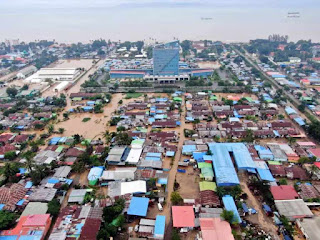Nudár obrigasaun konstitusional, kada tinan Governu submete ba Parlamentu Nasional Orsamentu Jerál Estadu (OJE) atu diskute, halo mudansa no aprova. Loron 15 Outubru Governu aprezenta Proposta OJE tinan 2022 ba Parlamentu, agora daudaun Parlamentu iha hela audiénsia hodi rona perspetiva oin-oin husi instituisaun ka konvida organizasaun sira. La’o Hamutuk hetan konvite husi Komisaun C no oferese testemuña no submisaun iha loron 15 Novembru atu ajuda informasaun antes tama iha faze debate iha plenária.
Ita bele hetan informasaun tan kona-ba prosesu no konteúdu OJE iha ne'e. Tuir mai, rezumu no informasaun husi submisaun ne’ebé La’o Hamutuk hakerek ba Parlamentu:
Membru Parlamentu no públiku presiza informasaun loloos no kompletu antes foti desizaun, desizaun sira ne’ebé mai husi baze faktu no evidénsia forte mak sei hamenus posibilidade ba sala no deside futuru Timor-Leste iha diresaun ne’ebé loos. Nudár ezemplu forte mak presiza informasaun kompletu husi Ministériu Finansas no TimorGAP kona-ba revalorizasaun investimentu husi Fundu Petrolíferu iha Greater Sunrise husi tokon $700 ba zero.
Projesaun ba futuru presiza halo ho sériu, kona-ba despeza rekorrente, despeza husi Fundu Infrastrutura no reseita petróleu. La’o Hamutuk nota katak iha Livru 4, despeza rekorrente kontinua sa’e 4% anuál iha kada liña, no despeza liu FI la muda husi 2022 ba 2026. Laiha informasaun kona-ba reseita petrolíferu hafoin 2023. La’o Hamutuk haree númeru sira ne’e la ho baze planeamentu ida sériu, no husu atu PN diskute kle’an ho Governu hodi hatene klaru kada programa no projetu sira ho kustu tomak no nian projesaun sira.
OJE fó projesaun despeza la sustentável ba tinan tuir mai. Governu halo planu despeza la tuir situasaun finanseiru Timor-Leste nian, preve projesaun boot liu iha momentu ne’ebé produsaun mina no gas atu remata, fundu petrolíferu ameasa atu hotu no kapasidade ekonomia doméstiku seidauk forte atu sustenta nesesidade Estadu no Povu nian. Nune’e, ami sujere atu PN diskute kle’an ho Governu atu konsidera ita nian situasaun finanseiru no ekonómiku antes deside diresaun dezenvolvimentu ba futuru. Timor-Leste nian rezerva mina no gas kuaze konverte ona ba osan, ne’ebé agora investe hela iha merkadu finanseiru internasionál ne’ebé ninian flutuasaun ita labele kontrola, husi Fundu Petrolíferu uitoan ne’ebé ita iha, sei mohu leet de’it kuandu ita la uza ho matenek hodi ajuda harii rekursu umanu ida ne’ebé forte no harii setór produtivu ne’ebé sustentável iha rai laran. Nudár ezemplu, maske Governu atuál deklara atu halo avaliasaun ba planu harii Projetu Tasi Mane ho nian komponente sira, too agora ami seidauk haree prosesu avaliasaun maibé kontinua aloka osan hanesan tokon $1.5 iha 2022 no tokon $747 ba tinan 4 tuir mai, inklui alokasaun atu dezloka komunidade sira husi fatin ne'ebé karik nunka hetan projetu foun.
Presiza informasaun kompletu kona ba impaktu husi empréstimu. Too agora Governu Timor-Leste halo ona empréstimu total liu tokon $500, husi empréstimu ida ne’e presiza iha liu tan informasaun kona-ba planu klaru ba desimbolsu no planu atu halo tan diskusaun ba empréstimu foun. Proposta OGE 2022 introdús bareira ba empréstimu foun mak tokon $410. Ami sujere ba Parlamentu Nasional atu diskute kle’an kona-ba implikasaun husi empréstimu ne’e ba tempu naruk Timor-Leste nian.
Sistema orsamentu 'Bazeia ba Programa' seidauk la’o tuir objetivu no subar informasaun esensiál. La’o Hamutuk hanoin orsamentasaun bazeia ba programa di’ak atu hametin sistema orsamentál, maibé bainhira entidade sira aloka atividade oin-oin ba kategoria programa sira la tuir realidade, ka laiha konsisténsia, bele hamenus transparénsia no falta atu lori benefísiu ba prosesu orsamentál. Nune’e ami sujere ba Parlamentu Nasional atu diskute kle’an ho Governu hodi hadi'ak liu tan sistema orsamentasaun ne’ebé promove liu tan transparénsia no akontabilidade, no atu fornese informasaun kona-ba alokasaun ba kada órgaun no diresaun estadu nian.
Tenke investe liu iha rekursu umanu, hanesan edukasaun, saúde, bee no agrikultura. Ami nota diferensa boot entre narrativa Governu nian sobre prioridade ba setór sosiál no ekonómiku no alokasaun sira, tanba iha proposta OGE 2022 Governu aloka de’it 17% husi total ba funsaun importante haat ne’e. Ami enkoraja atu Deputadu/a sira diskute no hamutuk deside diresaun orsamentál ne’ebé bazeia ba realidade atuál no ajuda duni povu ne’ebé merese liu atu hetan tulun.
Labele fó subsídiu ba funsionáriu públiku bainhira komunidade rurais barak enfrenta hamlaha. Ami nota katak planu oferese subsídiu tokon $25 ba funsionáriu iha kontradisaun ho objetivu ne’ebé Governu define atu alkansa seguransa ai-han, hadi’ak nutrisaun no promove agrikultura sustentável. Ami sujere atu Governu bele organiza ho idea estratéjiku liu hodi oferese apoiu ba agrikultór sira duke funsionáriu públiku ne’ebé simu ona saláriu kada fulan.
Ami hare erru no informasaun sala barak iha dokumentu OJE nian, no husu Governu atu fó informasaun loos no PN atu konfirma dadus sira iha livru OGE 2022. Nudár ezemplu, Tabela 12 iha livru 1 hatete katak tokon $40.2 sei aloka ba EDTL, E.P. iha 2022, maibé alokasaun loos ho montante tokon $90. Aleinde ne’e, tokon $0.4 ba BTL, E.P., maibé realidade hamutuk tokon $17. Total husi tabela 12 mak sorin balu husi alokasaun loos. Bele haree tan ezemplu sira seluk iha ami nian submisaun.
La’o Hamutuk fó rekomendasaun espesífiku ualu ba Parlamentu no Governu, ne'ebé bele hare iha submisaun.






























